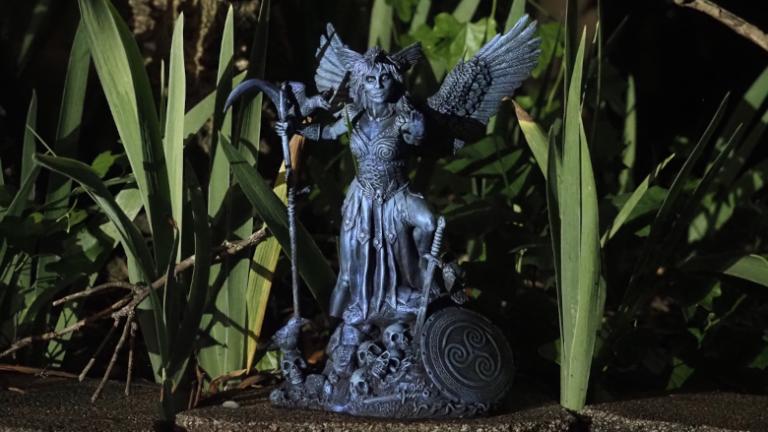I have one big question left from last month’s Conversations Under the Oaks. I left it to the end because it was by far the hardest of them all. I’ve been thinking about it for weeks and I still don’t have a clear and concise answer. But not all questions have clear and concise answers – that doesn’t mean they aren’t honest questions worthy of our contemplation.
Actually it’s two questions. One simply asks:
Can an evil spirit masquerade as a God to have a negative impact?
The other tells a long story of an unpleasant encounter with the Morrigan that may have been Herself being blunt and demanding (as She’s well-known to be) but that doesn’t sound quite right to me. This person asks:
I was wondering how to know if it was actually the Morrigan in that interaction.
I talked about some of this in Our Imperfect Perceptions of the Gods. But that post was more in the context of discerning if we’re hearing from a God or other spirit or if we’re just hearing what we want to hear. In this situation, the person is certain they’re hearing from an external agency and not from themselves. They’re just not sure the spirit in question is who they claim to be.

Roots in fear-based religion
This question is deeply personal to me… and that’s another reason I took so long to answer it.
As regular readers know, I grew up in a fundamentalist Baptist church – recovering from that took decades. They taught that 1) any spirit that wasn’t their God was their devil, 2) their devil could and would lie and pretend to be someone else, 3) following the wrong spirit would lead to eternal damnation.
So the pressure to get it right was immense.
How could you know you got it right? They always had a simple two or three point test that sounded reasonable from the pulpit, but when examined more deeply was full of holes and circular reasoning. And when those holes and circular reasoning were pointed out, the response was “you just need to believe the Bible” – which basically meant “stop asking hard questions and do what you’re told.”
That created unimaginable anxiety for me as a child and teenager. I do not want to see anyone suffering such anxiety in a Pagan setting. Following the wrong spirit may lead you to places you don’t want to go, but it’s not going to lead you into eternal torment.
But the core question remains: was that really the Morrigan?
It’s not always clear
Gods are always virtuous – that’s part of the definition of a God (or at least, it’s part of my definition of a God). But “virtuous” doesn’t mean “nice.” And as others have pointed out, there are trickster Gods who will twist the truth, using what appear to be unvirtuous means to achieve virtuous ends.
The Fair Folk either cannot or will not lie, but they will spin the truth so fast you’ll think up is down and you’ll believe something that’s not what it appears to be. Lesser spirits can and will lie. And sometimes spirits – including our beloved ancestors – are simply incorrect. I’m not sure who said it first, but it’s true: “just because they’re dead doesn’t mean they’re smart.”
I got caught up in this some years ago. A lesser spirit had me convinced they were a greater spirit. An experienced local friend spotted the problem before I made an appeasement offering that would have been gladly devoured by the lesser spirit and done nothing to clear the debt owed to the greater spirit.
Here’s the point: this isn’t easy and straightforward, and anybody who tells you it is either doesn’t have much experience in the matter or they’re trying to sell you something. Or, like the fundamentalists of my youth, they’re trying to coerce you into obedience.
So what can we do?
Discernment, relationships, and time
We begin by practicing good discernment. Build a base of knowledge around the deities and/or spirits in question. Read the stories of our ancestors. Read the accounts of contemporary priests, devotees, and other followers. Who are they? How do they present themselves? What kinds of things do they want from people? What do they offer in return?
Then compare what you experience to the experiences of those who’ve gone before you. Does this look like the Morrigan? Does it sound like the Morrigan? Is this something the Morrigan is known to do? If so, you should probably assume that it is the Morrigan and act accordingly.
And if it’s not? Ask more questions. Do divination. Find (and pay) a good polytheist diviner, someone who shares your understanding of Gods and spirits and not a generic psychic who may give good advice on life but who would assume a Battle Goddess is “part of your higher self.” Divination may not give a complete answer, but it will often bring some clearness to a complex question.
True clarity takes time. Lots of time. It takes building and maintaining relationships. Regular prayer, meditation, and offerings are how we build relationships with Gods and other spirits. Speak to them and listen for them. Learn to hear their voices – learn to distinguish the voice of the Morrigan from the voices of other Gods and spirits.
Certainty is not possible – be open to becoming closer to right
This comes slowly. For those of us who tend to be literal-minded it comes even more slowly. Months and years, not days and weeks. Even then, we can never be 100% certain.
The fundamentalists of my childhood claimed to be 100% certain. They were lying… though I think they were lying to themselves even more than they were lying to me. If you’ve always been told that being wrong means going to hell, you’re not going to want to admit there’s even a chance you’re wrong.
In politics, when you present people with facts that they’re wrong, most times they’ll ignore the facts and double down on what they want to be true. They don’t want to admit they were wrong. It’s the same in religion.
It’s OK to be wrong.
It’s OK to make mistakes.
It’s not OK to perpetuate errors because you refuse to admit you were wrong in the first place.
Confidence comes with practice and experience
What this means in practice is that every answer is a tentative answer. We work through our discernment process and we come to the best conclusion we can make, given the information and understanding we have at the time.
Then we move forward, and our future experiences either confirm or rebut our previous interpretations. Over time we notice patterns and consistencies: the Morrigan does this but not that, Cernunnos does that but not this. We learn to calibrate our own intuition: when I feel this way what I’m hearing is usually true, but when I feel that way what I’m hearing usually turns out to be false.
We can never be 100% certain. But with time and effort we can move from 60% certain to 80% certain to 98% certain to where ever it is I am with the Morrigan now, which is that while I’m never completely sure, my interpretations of what She says to me are almost never wrong (within the limits of what She actually says to me – that doesn’t mean I know everything about the Morrigan. I most certainly do not).
Nothing in the realm of religion is ever certain. Not about the Gods, the spirits, the Otherworld, or any of the other Big Questions of Life. So we move forward with what we believe is most likely, and when we find out we’re wrong, we make necessary corrections.
So, was that really the Morrigan?
As I hope you understand by now, I can’t say for sure. It’s hard enough to figure these things out for yourself, much less for someone else. You have only their reports of what happened, not the first-hand thoughts and feelings and impressions as they happened. But I can say this much.
In all my years of worshipping, working for, and working with the Morrigan, I have often found Her to be harsh and demanding. She wants what She wants and She wants it when She wants it. Transparency is not one of Her virtues – never expect Her to explain why.
But I have never found Her to be cruel or capricious. She’s never asked me to do anything that wasn’t eventually shown to be in the promotion of Her values and virtues. And I’ve never found Her to be wasteful. She’s a commander who keeps Her forces in good condition, whether weapons or materials or humans.
If it’s hard, unpleasant, and scary, but ultimately necessary? That’s probably the Morrigan.
If it’s flippant, cruel, or dishonorable? That’s almost certainly not Her.















